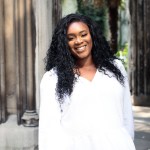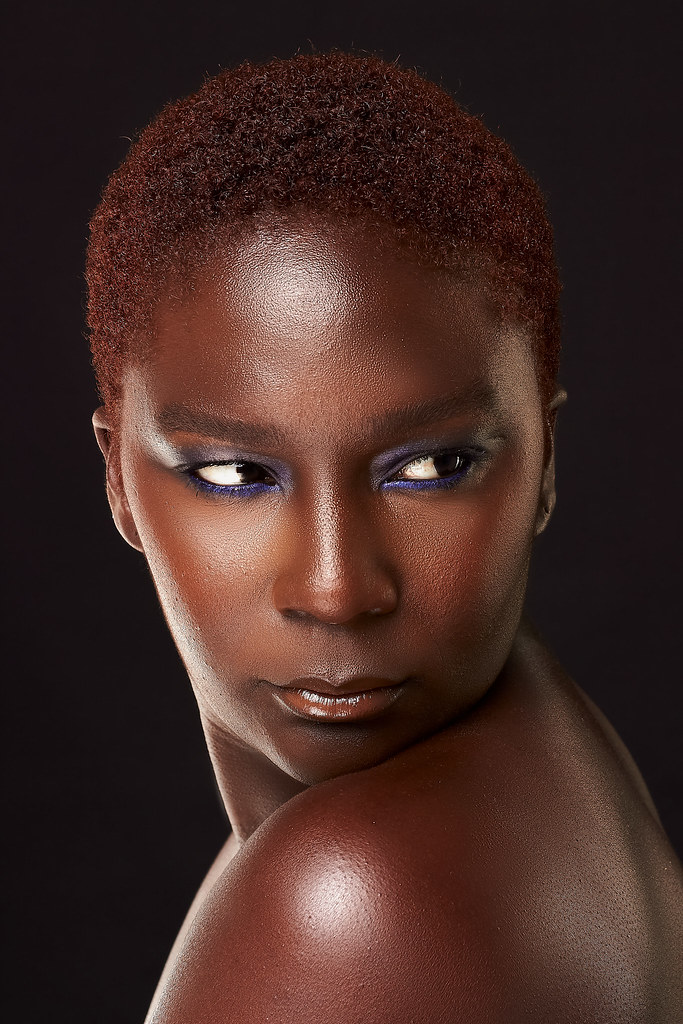1. Please introduce yourself. Who are you? What do you do? How long have you been into photography?
Hi, my name is Tobi Sobowale. I am a Black, British–Nigerian multidisciplinary artist. I am a photographer, writer, poet, and architectural designer. I primarily focus on Black women as the subject of my photography and have been doing so for the last six years.
2. In one sentence, please describe what you captured in this shot.
A woman who is bold, who is strong, who is also delicate, vulnerable, and soft.
3. Why did you select this photo to share?
I love the colours, the composition, and lighting of this photo. These are also three elements of photography that I experiment with. I love the strength and grace that is exuded by Karen.
4. What style of photography would you describe this as and do you typically take photographs in this style?
Over the last few months, I have spent a lot of time focusing on beauty editorials. I love to experiment with light, contrast, and composition and love to present Black women in as many ways as possible. I used a beauty dish to light the model, which creates harsh shadows and depth.
5. When and where was this photo taken?
I took this photo on Friday, June 25th of 2021, at a studio in South East London. I actually won free studio time through a giveaway and was grateful for the opportunity to create work without the additional studio costs.
6. Was anyone with you when you took this photo?
My friend Morelle, the make-up artist Riana, and the studio manager were all present. It was a fun and creative atmosphere full of music and laughter. Usually, I do not have many people present when shooting but I loved the energy that each person brought to the set.
7. What equipment (hardware and software) did you use?
I used a Canon 700D and Canon 50mm lens. I have had my 700D for six years and although I believe it is time for an upgrade, I think it is a testament to the fact that you do not need expensive equipment to produce high quality work. I love the 50mm lens (often referred to as the nifty fifty). It works well for beauty shoots as it produces sharp images. It also means that my camera is almost always close up to the model’s face. For the past few months, I have been shooting tethered using Capture One Pro and my laptop. Thanks to the Black Women Photographers community, I received a free license to Capture One which has significantly improved the quality of my work.
8. What drew you to take this photo?
Karen reached out to me a couple of months before to work together. I then put together a mood board to explore ideas, which changed a few times. It was important that the concept was inspired by Karen’s features. I created this concept inspired by her copper-coloured hair, her skin, and eyes.
9. How many attempts did it take to get this shot? How long did it take you to get one that you were satisfied with?
Altogether I took about 350 shots and this is around number 100. I looked back over the time signatures and it took me 30 minutes to create ones that I was satisfied with. This shoot was a collaborative test shoot, which means that I started off by experimenting with light placement and different lights. Often with this style of shoot it takes a bit of time before I create a light setup that I am satisfied with.
10. Did you edit (or do any post-processing/production on) this photo?
Initially, I colour graded the image using Capture One and then retouched the image using Photoshop. For me, it is important not to over-retouch images, not to remove scars or too many spots, so I kept it to a minimum. Beauty photography often presents a false narrative as women are often misrepresented. Noses and jawlines are made slimmer. It’s important especially when photographing Black women not to conform to Eurocentric standards. So, when I do retouch, I never reconstruct the model’s face shape or features.
11. What encouraged you to share this photo online and with others?
I think it is some of the best work I have produced. As a creative, sharing my work online is an important tool for developing my art. In this case, it gives people an opportunity to understand my work and process.
12. Did you learn anything in the process of taking, editing, or sharing this photo?
What you envision for a shoot when putting together a mood board, is often not what is produced in the end. This is not necessarily a bad thing, and in some cases the final output is much better. It has encouraged me to keep experimenting and developing my craft.
13. Do you remember what you had for breakfast (or lunch or dinner) the day you took this photo?
I had leftover Chinese food for lunch.
14. What would you like people to take away from this photo?
I wouldn’t say anything specific. The beautiful thing about art is that everyone is able to perceive it differently. Whether it’s an emotion, a feeling, a thought, I want my work to be memorable.
15. Is there any feedback that you’d like to get on this shot?
Definitely, I would like to know what people feel when they look at my work! It’s always great to hear what people think of my work.
16. How can anyone reading this support your work?
You can find me on Instagram at @shobo_photography, on Flickr, or through my website at www.shobolondon.com. I will be selling prints of these photos and a few others later this year.
 Editor’s note: This interview with Tobi Sobowale is part of a series with members of the Black Women Photographers community. Tobi is a British-Nigerian multidisciplinary artist based in London. Growing up, Tobi battled with insecurities regarding her appearance and began to use photography as a way to repair her relationship with her self-image, and explore ideas around value and self-worth. She wants Black women of all ages to see her work and feel empowered, encouraged, and inspired. Her photography showcases the beauty and diversity of Black women – that they are strong and bold but also soft and vulnerable.
Editor’s note: This interview with Tobi Sobowale is part of a series with members of the Black Women Photographers community. Tobi is a British-Nigerian multidisciplinary artist based in London. Growing up, Tobi battled with insecurities regarding her appearance and began to use photography as a way to repair her relationship with her self-image, and explore ideas around value and self-worth. She wants Black women of all ages to see her work and feel empowered, encouraged, and inspired. Her photography showcases the beauty and diversity of Black women – that they are strong and bold but also soft and vulnerable.
Please give a warm Flickr welcome to Tobi and head here for more interviews in this series.
